#each thing diametrically opposed to itself
Explore tagged Tumblr posts
Text
You transfathom colorpush, numbertoss, misconception, many say: it's you, we disknow it, many negate themselves on you, you who affirm them one by one for yourself, insurrectionary like the stonecourage, given as present to the handsaid, who raised himself to the world at the seam of the turned silence and of all danger.
– Paul Celan, "[You transfathom]", trans. Pierre Joris
#each thing diametrically opposed to itself#the living are incomparable#god#paul celan#poetry#pierre joris
3 notes
·
View notes
Text
Dorohedoro

Dorohedoro is a weird book. And not for the reasons it presents itself as weird, like its big gyoza-eating lizard man, the fact that half its characters unironically dress like clowns, or its B-movie levels of gore. No, Dorohedoro is weird because its storytelling is so unusual. It’s goofy and unserious, despite the horrors and violence constantly inflicted upon its characters; those characters are consistently nonchalant, despite urgent stakes that would drive the plot forward in any other story; and that story is willing to take its sweet time, sparing no expense in how many group dinner scenes can be fit into its 23 volumes. Yes, Dorohedoro has a very deliberate and well-realized style – it’s just not one that clicks with me.
Ultimately, when I get down to it, I think the disconnect is one of sensibilities. Dorohedoro is very transparently a nihilistic work; its world is full of grim horrors, and terrible things happen to good people for no real reason. And while I don’t disagree that this is how the world works, there’s something about media that focuses in on that hopelessness and peppers it with callous violence that doesn’t resonate with me these days. Let me elaborate by examining one of Dorohedoro’s strongest recurring themes: the idea of transactional relationships versus genuine friendship.

For my money, there is nothing sadder in Dorohedoro than the chapter where Ebisu dies and no one gives a shit.
While Nikaido and Caiman are ostensibly the main characters of Dorohedoro, the manga is unique in how much time it gives us with En’s family, our purported antagonists. This isn’t limited to typical villain stuff, either, where we watch them do reprehensible things to cement their status as baddies; no, we spend a lot of casual time with Shin, Noi, and the whole crew, getting to know them as people. It’s a very humanizing approach: sure, these folks are cleaners who go around killing people that run afoul of En’s family, but they eat hot pot and shop for new clothes with their friends, same as the rest of us. They care about each other, same as Caiman and Nikaido do, Dorohedoro implores, they simply happen to find themselves diametrically opposed to our leads.

And then the 13-year old girl who sees them as role models and follows them around like a puppy gets her head split open and dies, and none of them but Fujita are willing to spare a single minute to help. And to be clear, that’s about how long it would take: En’s family owns a magic… dog? cat? with the ability to bring the dead back to life instantly, with no opportunity cost. They simply do not care: everyone no-sells Fujita carrying Ebisu’s corpse around, shows no concern, and are all unwilling to interrupt their daily tasks to help revive her. As far as they’re concerned, this girls’ death is Just Not A Big Deal. This shocked me at first: how could these people, her friends, not care that one of their own is dead? After giving it some thought, though, I realized this reaction is right in line with their past behavior: despite all the time we’ve spent with them that made me humanize En’s family, the only thing we’ve seen them care about is power.
The imbalance of power and its effect on sorcerer society is highlighted in Dorohedoro near-constantly. A sorcerer’s magic is innate; though they can attempt to refine their power through training, their abilities are something they’re born with, and the inherent power levels run the gamut from world-breaking to useless. En is one of the strongest sorcerers we see in the story. His abilities are not only powerful, but versatile: his mushrooms can kill in all sorts of gruesome, intractable ways, yes, but they can also serve as protection, transportation, autonomous servants, or even be cultivated as products. People like Fujita, on the other hand, have powers so weak they’re barely even usable in combat. So, while En’s cunning and business acumen no doubt played a role in his ascension, it’s clear that the sheer luck of being born with such overwhelming talents was one of the biggest factors.

Well aware of this imbalance, En has built his entire organization around exploiting it. Though En’s family is extensive and well-connected, none of them are there because he likes them, or because they’re friends; the people he surrounds himself with are there solely because of their unique and powerful abilities. Take Chota for example: En actively can’t stand to be around him, but still keeps him locked up in the compound because Chota’s ability to undo others’ magic is so rare. Each member is only worth what they can do for En, and this mindset, intentionally or no, trickles down the food chain. Thus, because Ebisu serves no crucial function within the family, because her absence does not directly impact their lives, her death simply isn’t important to anyone – her life is disposable.
The Hole gang, on the other hand, is the antithesis of that mindset – they’re a found family that sticks together just because. Nikaido doesn’t like Caiman because his immunity to magic makes him powerful, she simply likes Caiman. Shit, look at Jonson – he basically followed them home one day, and they’re like, “Well, sure, he mostly just kinda hangs out and shrieks in unintelligible bug language, but… he’s part of the crew now!”

And, crucially, they treat everyone this way, not only their in-group. Despite the two being strangers, Caiman leaps to Fukuyama’s aid without a second thought because he likes helping people in trouble. Kasukabe helps everyone that asks, too; sure, you could argue that it’s mostly due to depraved scientific curiosity, but he does his best to help out even sorcerers. They’re a group of altruists: rather than being beaten down by the unrelenting nature of the Hole, they’ve realized that sticking together is all anyone really has.

This dichotomy shows up constantly throughout Dorohedoro – it’s baked right into the worldbuilding. In the sorcerer world, masks are a sign of wealth and status; those who have connections flaunt bespoke, devil-crafted masks, while the poor settle for mass-produced store-bought varieties. They all wear a mask regardless, though, because at the end of the day, life in the sorcerers’ world is about brandishing power, while leaving your true self hidden underneath*. In the Hole, no such custom exists – no one gives a shit who you are or how you present yourself.
*We even see En’s gang repeatedly fail to recognize each other when their masks are off, further highlighting their impersonal, transactional relationship.

The Cross-Eye gang present an interesting subversion. Sorcerers with weaker powers like them are typically relegated to the lower caste, left to scrabble for power in an attempt to move up the societal ladder. Instead, the Cross-Eyes reject this system, forming a gang based purely around loyalty and brotherhood. It doesn’t matter to them how strong or weak your abilities are – as long as you’re willing to give everything for the group, you’ll be accepted. Their renunciation of the status quo is shown in their character designs: the majority of the gang abstain from wearing masks, choosing instead to proudly display their tattooed faces. Despite seeming more egalitarian on the surface, though, the Cross-Eyes’ maxim ultimately boils down to blind faith to their Boss; this leads to their downfall, their sanity stripped away by the pogroms they commit in their leader’s name, before his eventual murder of nearly all of the core group.


So, the thing that just doesn’t square with me is that I think Dorohedoro still wants me to see it as this light, breezy, slice-of-life story. It wants me to put aside these characters’ cold-blooded cruelty and feel affection for them anyway, and I don’t.
It wants me to read the chapter where Fujita heaves Ebisu's lifeless body around like a wacky misadventure, and I can't.
If anything, it feels like a tragedy watching hapless people like Fujita*, who shows time and time again he does value helping other people, get wrapped up with such shitters. Look, bait the Shin x Noi romance all you want, Q – a CEO and his toadies are a CEO and his toadies, mushrooms or no.
*Or Natsuki, whose death stands out as unfair and cruel even amidst a series as brutal as Dorohedoro. From bubbly and laughing to a piece of meat on the floor in seconds, her face looking away the whole time, rendering her humanity inert.

why is Dokuga a mothman? it was just, you know, his style at the time

I don’t wanna get too deep into this next piece – this journal is already running way long and way late – but the pacing and stakes truly are bizarre in so many ways. At any moment, Dorohedoro will put a pin in a scene and have the characters stop what they’re doing, sit down, and cook a meal together – even if they’re enemies. Dorohedoro will spend three chapters on its characters playing baseball together, and somehow still manage to advance crucial plot points; meanwhile, characters going off on an urgent rescue mission will get distracted, start working at a pie shop or whatever the fuck, and fully disengage from the plot until they fall back into it ass-backwards. Dorohedoro chapters will end with wild cliffhangers where an important character meets a grisly death, and 99% of the time it won’t matter because one of the main characters can, and constantly does, bring people back from the dead*. Right at the story’s climax, Dorohedoro will give its protagonist a strange affliction that forces them to smile unceasingly, resulting in some of the series’ most emotionally charged character moments playing out with all the expressivity of a mannequin.
*Part of me hated how much Noi’s powers kneecapped any sense of stakes or drama these moments might have had; I feel like I would’ve been furious reading month-to-month. Q manages to make death an interesting part of the story anyway, though – En’s death, for example, despite eventually being reversed, causes a compelling narrative paradigm shift AND results in one of Dorohedoro’s coolest ‘worldbuilding supports storytelling’ moments.
This is an observation, not a criticism. Q Hayashida is chaos.

you ever just... threateningly ate fried chicken at somebody?

—

Honestly, though, maybe one of the biggest obstacles to me in Dorohedoro was just that I wasn’t thrilled by the art (the interiors, mostly). I think Hayashida’s design sensibilities are great, particularly in her worldbuilding – from characters’ ever-changing clothing to the well-realized cities and environments we visit, Dorohedoro’s setting is singular and unmistakable. But despite fitting the rough-and-tumble tone of the series, the scratchy rendering style doesn’t terribly excite me. There was a period starting around volume 3 that I really dug; Hayashida seemed to have gotten comfortable with the characters and the style, and started experimenting. The following few volumes feature lots of unique ink textures, slick screentone usage, and lots of creative, collage-like layouts. Soon enough, though, it seems like the unceasing nature of manga schedules caught up to her, and the rendering starts taking a backseat again.





some of my favorite layouts



some of my favorite inks. genuinely one of the best rain tricks I've ever seen

also these panels where Noi is drawn like a shoujo character lmao
I know there’s no way it would be sustainable, as Dorohedoro is fucking lengthy, but it would have been so fucking rad if the whole thing was painted. Q really feels in her element for all these painted pages – they’re vibrant, and filled with rich texture. Too bad the US publisher couldn’t even be bothered to print these color pages in color, instead printing them in a washed-out greyscale from volume 4 onwards.


96 notes
·
View notes
Text
One of the big things that drives me INSANE about Naruto is like.....There is SUCH an emphesis on characters mirroring each other and history repeating itself and the cycles of life/war/friendship/love/hate. Every character is a reflection and/or foil of at LEAST two other characters. So, even with minor characters we know almost nothing about, we can kind of fill in the details just based on who they're compared against or put in oposition to. We know almost nothing about Izuna, except that Madara sees him in Obito and he was diametrically opposed to Tobirama, but just from that you can fill in the negative space of his own personality. Rin is characterized through how she parallels past and future iterations of team 7 (the trick is that she's the naruto of her team, not the Sakura). Shin was like Naruto, if Naruto was a big-brother-inverse of Itachi so that Sai could foil Sasuke even though they rarely ever interact. SO many characters are soley defined by their comparison to either Naruto or Sakura. Naruto really is just a story about how you are defined by your relation to other people, for better and for worse.
#on a related note. I now have a spreadsheet determining whether most every character in Naruto is a sakura or a naruto or on RARE occasion#a sasuke.#naruto#naruto meta#team 7#naruto uzumaki#uzumaki naruto#sakura haruno#haruno sakura
104 notes
·
View notes
Text
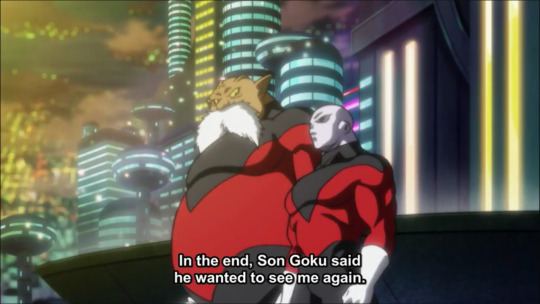
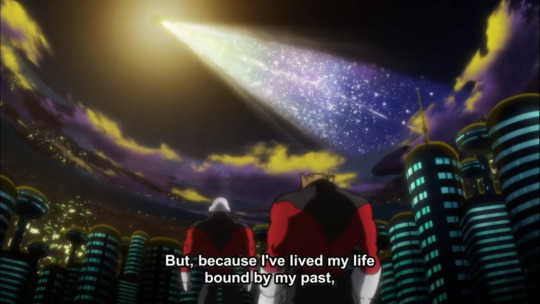
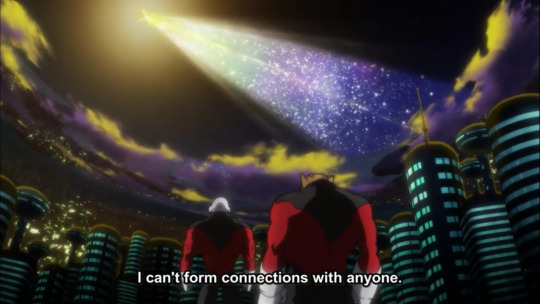
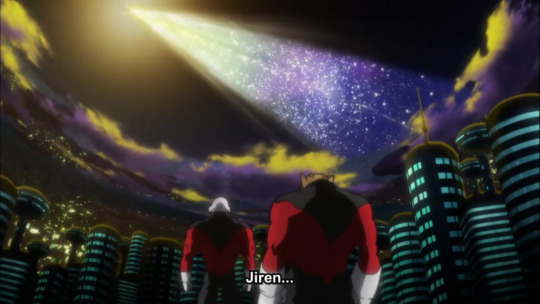
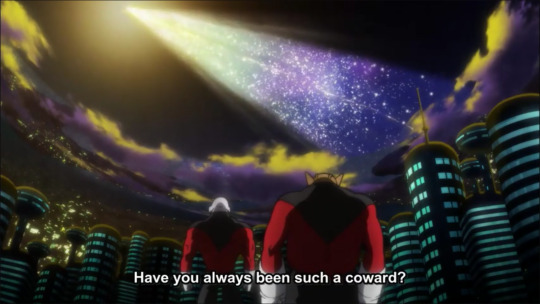
KEEPING IT REAL WITH JIREN & TOPPO
First of all I love that the final antagonist of the arch was somebody who fights for nobody but himself, but not because he has a wonderfully large ego like Freeza, but rather because he purposefully chooses to and has crafted a philosophy that calls for this. He, unfortunately, believes this with his full capabilities of conviction. He has sacrificed so much in this belief.
So many times Goku and the others credit their strength to the way that they fight for others. Then here comes a guy who is unfathomably strong, and he has gotten here by fighting for nobody but himself.
But in the end he can't win, and it is the teamwork of the most UNLIKELY DUO that brings him down. And as these two diametrically opposed warriors both sacrifice their time in the ring in order to bring Jiren down with them, Jiren realizes that the "secret" to the Seventh Universe's strength is "the power of trust."
Which again. I am kind of sitting here in awe about. Goku and Freeza. Took a chance on each other because they had to. Goku and Freeza. FREEZA. He didn't want to do it. He did not want it to end this way. But he did it. With a heated fervor he did it. With a tactician's clarity he ended this all the while incorporating Goku's strength into his strategy. And they entrusted all to Android 17 as the last man standing.
And then it turns out that the Grand Zenos had a greater meaning behind this whole tournament, and that if the winner's wish had been a selfish one, they would have just wiped out all of reality as being not worth it! But if it was the "right" wish, a selfless one, then all the universes would be restored by the wish itself. They were sure that if the winning mortal wasn't already virtuous, then the challenge would have made them so.
Which. By the way. In all the philosophy our human minds have mustered. There are several distinct and overlapping theories as to what morality and ethics COULD EVEN BE. But on Dragon Ball Super, the supreme rulers of the multiverse have spoken: indubitably, morality is Helping Out Your Fellow Mortal even at the expense of yourself. WOW! Glad that the endless discussion has been concluded!!!
Morality is about MERCY and TRUST and ALTRUISM. It is Strength and Love and Passion.
WHAT A LOVELY AND COMPELLING STORY !!!!
Anyway back to Jiren.
He got really relatable and believable at the end there. Oh My Lord. He had felt the intolerable pain of loss in his time, and it at first encouraged him to respond to the villain who had wrought it. After his second great loss, he then could not deny what was glaring him in the face: that "might makes right." That's why he lost the first time, and that's why he had lost the second; it was because he wasn't strong enough, because HE wasn't strong enough, he could not rely on something as fallible as teamwork and virtue in order to win. All those things are corruptible, beliefs can change - but the hard, tangible reality before him is that when two opposing forces meet, THE MIGHTIER ONE WILL WIN.
And that was how he made sense of his world. Any organism is tasked with making sense of its world, and that perspective needs to meet the needs of the organism. Us humans, as instinct, incorporate emotional, social, logical, practical, and spiritual nuances when we are tasked with "making sense." It has to make sense TO US, therefore use all that we have to offer.
I appreciate Jiren as a character who so succinctly conveys our own nature to us. At moments of survival, one of the many vital tasks of the nervous system is to figure out the WHAT. Past the moment of impact, we continue to "make sense" of what it was retroactively, as its effect on us permeates. This is how we learn for next time. When Jiren first experienced that loss in his youth, he at first found his purpose in virtue, and that he was justified in righting this wrong both morally and by his own internal feelings of rage. After he lost again, he made a new sense by wiping away what now seemed like distractions so that he could see the overwhelming villain for what it was: SHEER POWER, nothing else. His comrades disassembled, his new family was destroyed. They could be conquered and their behavior altered. They could be killed. The only intransient thing that Jiren had seen was the absolute rule of cause and effect, of win and lose, of kill or be killed. Might makes right because might decides what happens at all, it IS morality by virtue of being the last man standing, it is reliable.
So in a perfectly predictable twist of fate, Jiren commits himself in totality to the rules that had destroyed him. But this time, he would yield the reins and use that law for his own favor. He has been convinced of the irreproachable legitimacy of Might, and he would have it for himself.
Because here's the thing. And this is what I'm REALLY interested in. This is what it all comes down to, everywhere you look, and what I'm so delighted to see expressed in his character.
WHAT was he fighting for? Rather, WHY was he still fighting? Not for hope, not for goodness, not for others. For himself, okay, but why does he NEED this?
He's not fighting FOR something, but AWAY from something else - he is compelled to keep improving in order to avoid EVER FEELING THAT LOSS AGAIN, by his own admission and by the other characters' astute wording.
But it's not just the pain of loss. What he is so utterly compelled to FIGHT AGAINST, what he cannot TOLERATE, is the feeling of HELPLESSNESS.
I felt that feeling a lot in this arch. I felt it from the Destroyers and Kais sitting on the bench, knowing that their lives were on the line but that all they could do was sit and stifle it, while their angels sat blithely behind them. Are even gods just pawns in this grand cosmos?
Okay let's get real. The human reflex (and ability at all) to Avoid Feelings is what grants us our traumatizability. Something about our relatively huge frontal cortex allows us to suppress sensations, reactions, feelings, and other interoceptive experiences that would normally be restorative. The reason that animals don't get traumatized seems to be because they experience in totality their own activation, the freeze states if engaged, and then the release of the energy that had been mobilized in their system for survival.
I am not bullshitting you. Read Dr Peter A Levine
One of the biggest obstacles in trauma healing for humans is our reflex to AVOID HELPLESSNESS and therefore to AVOID embodying our own freeze responses. It's a complex and bizarre thing, but our own health and survival is interwoven through all of our neurological layers, and so deficits or damage presenting to our "higher" layers of mammalian perception very much can generate a response that we'd think more typical of the "lower" layers. The pyramid base of our most primitive coding supports all of us. The essence of the freeze/collapse seen in an overpowered reptile can be seen in a human infant overwhelmed by a lack of warmth and loving care. To a social mammal, not feeling that connection is devastating and means death. And a baby cannot fight or flee. Do you see where I'm going with this?
I AM NOT BULLSHITTING YOU!!!!! Read this book & his other books & other books by people like Bessel van der Kolk and Gabor Mate ETC
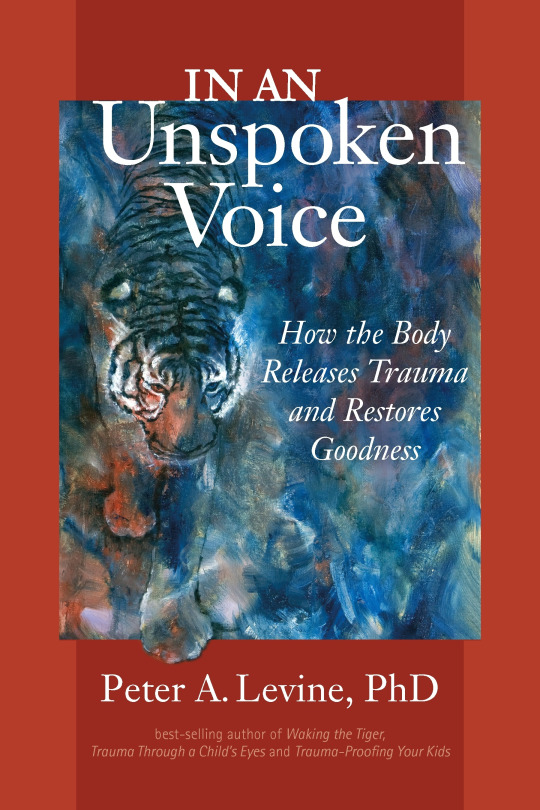
(Image ID: Super Interesting book called "In An Unspoken Voice" by Peter A Levine)
The key to resolving trauma is to be able to move through, or rather embody and gradually release, the visceral reality that did not get processed at the time of impact. The basic fundamental rules of instinct can still be found when we talk about more "abstracted" forms of trauma like developmental and emotional. But understand that one person is one structure of unity, necessarily so because how could we have evolved otherwise - and mind IS body and body IS mind, and invoking response in one entails a response in the other. Mind and body are not distinct entities in anything but prevailing societal philosophies.
Soooooo. Anywayyyyyy. Bear with me here. A lot of human trauma comes when a freeze state is entered and never properly exited. Those states are meant to be self-terminating, but through the power of the human brain, we can avoid letting things flow naturally. And again, in the complex evolutionary nuances of us primates, this doesn't have to be a hard collapse. The same instinctual wiring can be founds in things like a partial collapse of some systems (voice not working, anyone?), all the way over to just a general dull & dead disassociation. When sympathetic arousal of the nervous system pays out no dividends, the last resort is to full-reverse into parasympathetic shutdown. But when that happens, the "survival energy" (as is frequently termed in the book I mentioned above PLEASE READ IT) does not just go away. It was still mobilized, the muscles are primed, the nerve cells are primed, all systems are go, but it all just STOPS for a bit. To give the tiger time to give up on you. And then, when it's time, freeze will terminate, and all that energy is still there for you to either launch a rageful counter-attack or to engage in a quick flight - whatever seems to give you the higher chance of survival.
As the energy is held in reserves, so is the full state that you entered freeze with. All of the visceral sensations of rage, fear, and helplessness.
That is why humans avoid exiting a freeze. BECAUSE THAT STUFF IS REALLY HARD TO TOLERATE. The experience drove you to overwhelm for a reason. And if your nervous system did not develop in an environment of love and warmth and support, then it'll be less tolerant of difficult sensations, and you'll be more prone to disassociation and distraction. Many of us just go into shutdown kind of immediately without ever knowing it because we're detached from ourselves, we just know that we don't and can't do things but we don't feel "anxious" like what everyone else is talking about so what gives? (<- Me. But I have a lot more interoceptive awareness now so I can track it and so now I'm awesomne. I mean I'm still immensely fucked up. But there is now hope.)
Again it's all a very complex subject that fascinates me to no end & that I cant fuking explain becasue what do i know. Please Read Books <3 Please look up "somatic experiencing" or maybe just read the books. I have given that book above as a gift to several different people and I am going to keep doing it
So basically coming into contact with your own frozen-over intensely vulnerable states in order to move through them (resolve, release, renegotiate, etc), is a challenge. Human beings are fiercely social and our nervous systems are wired to respond to each others'; we cannot live alone, and we certainly cannot heal alone.
SO WHAT DOES THIS HAVE TO DO WITH JIREN FROM DRAGON BALL SUPER ????
I'LL TELL YOU. He is literally just running hardcore from that feeling of helplessness. He is resolved to Never Feel It Again.
And the person he represents you see all of the time in real life. There are one million ways to avoid resolving what needs to be resolved, overexertion is definitely one of them. There are definitely gym rats who exhaust their muscles in order to avoid feeling their twitching unrest, to avoid feeling small and weak. Think about the sort of mindset that a lot of people have when it comes to working out. It seems to be about punishment and discipline. Of course the people who have it right understand that it's about vitality, enjoyment, and patience - but think about how hard it is to convince someone more toxic-minded of that. Harboring that trapped survival energy will reduce the complexity of your thoughts and your comfort in having them; you get caught in black-and-white dichotomies, you get stuck in "kill or be killed," you get stuck in obsessive compulsions, you can't comprehend letting things flow and you can't be okay with it, your social systems shut down and you cannot feel the support of others, you don't feel in control, and everything at its roots seems to be about your own fear; so you overcompensate.
Jiren has made sense of his world. It is a vital thing to do. And he has decided what he has to do to overcome his enemy. But the reason that he continues to FEEL the enemy when it is no longer present is because he has not healed. His enemy is the horrible helplessness he had felt. It haunts him. It stays with him. He tries to conquer it. But it follows him. It threatens to one day consume him. And he finds the enemy in external circumstance (as we are biologically geared to do, at our lowest levels, to orient toward and to locate the possible threat, toward what has elevated us so), but the real enemy is within. It's because his pain has not been resolved. It is because he has not learned how to befriend his bodily states and to move through them.
And this is KEY here - It is because he has REJECTED FRIENDSHIP, the necessary visceral feeling of safety and love, which would serve as both his safe spot and his empowering resource as he ventures into his most difficult feelings. You need good experiences to counteract the bad in order to unwind those knots.
We see this sort of stuff all of the time in every single one of us. Jiren was a sensitive little boy with no reason not to be, who (like the best of us) felt every ounce of his world with wonder - and then he had it all ripped out of him by the most horrible circumstances ever. And with the threat still looming, he couldn't ever rest. That sort of chronic stress will twist you all up. And then when his world flipped over again, it must have been a huge relief to just embrace a simple, BELIEVABLE philosophy, and to just dedicate all of his anger and fear toward one task.
I'm just impressed to see it portrayed so plainly on Jiren. It's all of us. It's not hard to see, but there are many ways to see it. It takes a certain sensitivity and skill to pluck it out of the world and write it all down. And then especially his short conversation with Top that this post started with screenshots of. If he suffered such an intense loss so young, and then again years down the line, of course he can't make any connections. He's not just out of practice, but susceptible to opening the door to that pain again.
I really liked how this arch was about trust in the end. I noticed throughout it the prevalence of duos (two Zenos, Beerus & Champa, Androids 18 & 17, Piccolo and Gohan teaming up, and especially KALE AND CAULIFLA), but I tend to hone in on duos for my own complex reasons of being so I figured that that was just me. But then in the end when it took the Most Unlikely Duo In Cinematic History to take out and teach Jiren, I was like oh my word ... Poetic cinema.
So that's my post. I LOVE how it was all handled. So succinct as always in order to leave more room for the fighting. Unlike my posts which are long despite my best efforts. Thanks for reading. And read that book!! Chao <3
27 notes
·
View notes
Note
Hi! I have a question to ask you, someone who seems well versed in Marxism and its philosophy, over something that personally confuses me: is there a meaningful difference between materialism and objectivity? The way I've seen the former explained usually just makes me go "Oh, so it's really just about being objective", so I don't really understand why we need another term for it.
i actually think that there is -- at least in the marxist sense of materialism -- a huge gap between being 'materialist' and being 'objective'. a big part of the historical materialist rejection of idealism is the rejection of the idea of timeless, objective truth independent of its observer and context: as engels puts it in socialism: utopian & scientific:
As each one’s special kind of absolute truth, reason, and justice is again conditioned by his subjective understanding, his conditions of existence, the measure of his knowledge and his intellectual training, there is no other ending possible in this conflict of absolute truths than that they shall be mutually exclusive of one another.
the marxist perspective is inherently suspicious of objectivity, because the marxist analysis of society is cognizant of class struggle. because the goals of the bourgeoisie and the proletariat (or the king and the peasant, or the slaveholder and the slave) are diametrically opposed, there is very little that can be said to be 'universal', because the system of values that benefits one class is to the detriment of the other. marx summarizes this thusly in the german ideology:
For each new class which puts itself in the place of one ruling before it, is compelled, merely in order to carry through its aim, to represent its interest as the common interest of all the members of society, that is, expressed in ideal form: it has to give its ideas the form of universality, and represent them as the only rational, universally valid ones.
so the basic premise of historical materialism is that ideas (i.e. 'truths') arise from the material conditions in which they are developed. there is no such thing as an objective perspective because every perspective is situated historically in a particular time and place and set of social relations. claims to 'objectivity', then, are at best suspect, staking a claim to universality that erases class divisions and historical context.
marxism is not an 'objective' framework--it is proletarian, built from the standpoint of the working class and imperialised peoples around the world, and built upon and adapted for dozens of different historical circumstances by different leaders and thinkers. materialism is in opposition to the notion of objectivity, then, because materialism recognizes that all ideas (even one's own conception of materialism!) are ideas that stem out of dialectical interplay between not only previous ideas but the material and social conditions of the people who have those ideas. ideas and thoughts cannot be 'objective', under the materialist view, because to separate them from the context in which they arose is to distort and falsify them in the pursuit of universality.
361 notes
·
View notes
Note
What's one reoccurring motif in your fics that you like using a lot, and why?
There are a lot I can think of, like the economy of "favors" that Chase and Omi hide behind, trust and trust issues, how their martial arts as an extensions of themselves are so similar, repeating cycles, how destiny itself seems to be intent to both always bring them together but still always keep them just a bit too far apart...
But those are all motifs you get from canon itself, Chase and Omi already have a lot of layered theming in the show itself.
But a really fun one that I've used a few times in my fics and that I'd like to use more often is Food! Especially food as a metaphor for love.
It's a neat motif to write, fun to describe, and it's something that I think distills a lot about Omi and Chase's relationship to each other!
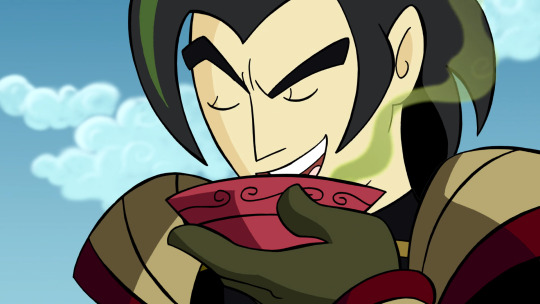
Chase is introduced in relation to his trademark food, Lao Mang Lone, and it's an understandably huge part of his character.
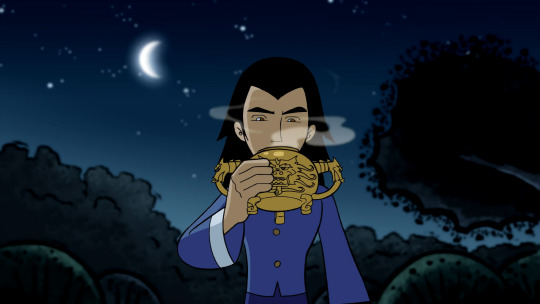
The soup was the start of this path for him and is an affirmation of this path. It's the only thing holding him together in some ways. It's apparently become his own personal blend distinct from the one he initially had, both because Chase wants to distinguish and distance himself from Hannibal and because Hannibal's version didn't seem particularly appetizing. He claims to always drink it before victory (which seemed to just be a false boast to provoke the monks, but still).
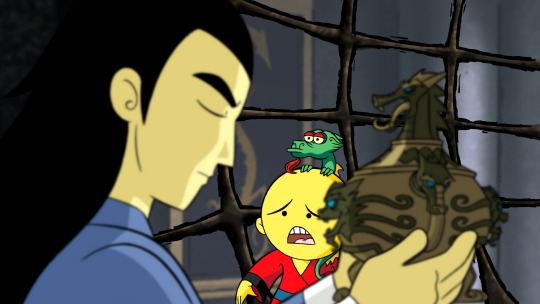
Omi and Hannibal are narratively Chase's two biggest relationships (at least the ones we see with the most focus and screentime-- his Guan and Dashi is revealed in bits and pieces).
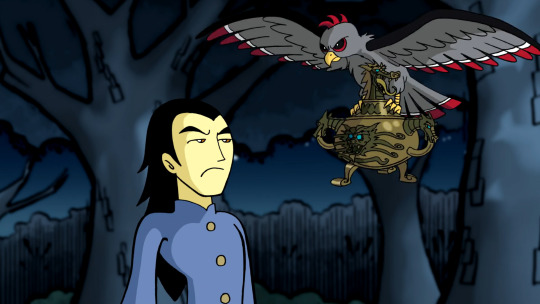
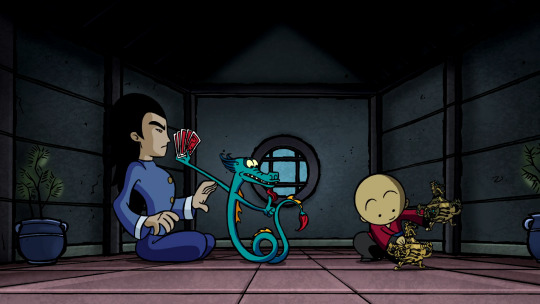
Those two are diametrically opposed in a lot of ways, but one small one is in how Hannibal made Chase Lao Mang Lone to "poison" him, and Omi made Chase pea soup in hopes of "saving" him. A misguided plan from both of them just because of who Chase is at his core, but Hannibal and Omi's plans are flawed for very different reasons.
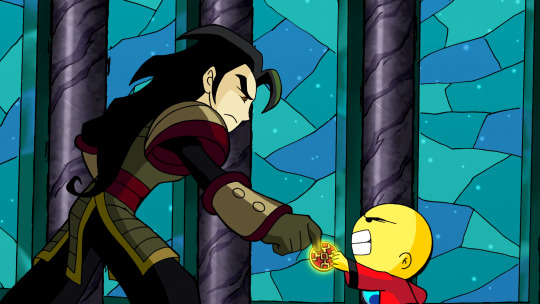
Chase and Omi are all about these little forms of love, these little shared moments, their pride in their similarities, their shared culture and interests, these subtle gestures to show they're thinking of each other, these hands extended in offering, these unspoken words in between their doublespeak.
And food is a really good medium for all of that!
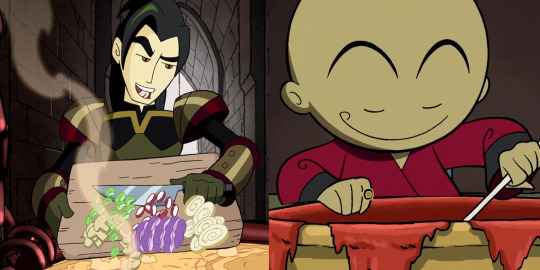
And there's also the fact that Chase and Omi both seem to enjoy cooking!


And eating, of course.
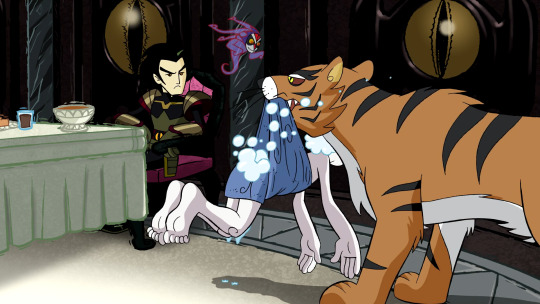
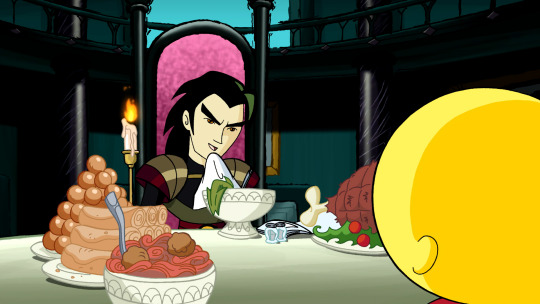
And with the Chase's spread was arranged and set out this time when he was expecting Omi's company, it gives the impression that he's trying to make Omi feel almost like an invited dinner guest who's free to join him. Compared to the previous episode when he brought Jack over in Dangerous Minds, there's so much more food set out, and Chase is smiling and sitting opposite the entrance he had the tigers guide Omi through. So it feels like cooking for each other is something they already want to do.
The things that the Food as a Love Language motif embodies fit them so well!
Wanting to learn memorize everything about the other person, including things as small as preferences and favorites. Worrying about another person and wanting to make sure they're getting what they need, like nutrients in a proper meal. Wanting to make something from scratch together with another person. Wanting an excuse to spend time together. Wanting to show that they were on your mind. Wanting to share a part of yourself and show off your skill.
25 notes
·
View notes
Text

My take on Meri's mother, based on the SCP-166 article: Donna Wojciechowska.
Still a work-in-progress but I wanted to share some things about her:
The name Donna is in reference to the Virgin Mary, the Madonna.
The "starlight in her eyes" bit from Clef's letter is definitely a metaphor but I thought it'd be fun to make it literal.
She lived in an isolated corner of the woods in Cornwall, stumbling on Clef (then known as Francis) at around age 14 and growing close in the coming years, mostly bonding on the both of them "not belonging" anywhere.
She suffered from malnutrition and could only barely hold herself up, leading to her laying down most of the time. So despite being extremely tall, she was usually just a bit over Clef's height (160 centimeters).
She could be described as a "benelovent goddess", or at least she thinks of herself that way. She was a very kind individual and was always concerned about others' wellbeing. She was also extremely sure of herself as being right all the time and as an authority. She thought she knew what is best for everyone.
Her intent with Occult Procedure Clockwork Blackchild Havilah was to restart society to allow for the anomalous to exist freely. In her mind, the world was irreperably hostile to their existence, and they needed to return to before the "status quo" was created and imposed with such force. Eden WAS a place to her!
Consequently, she was at odds with Clef once he started to collaborate with the Global Occult Coalition. They still very much loved each other despite, you know, being diametrically opposed on how an anomaly should carry itself out in the world.
#scp#donna wojciechowska#Threat Entity 9927-Black#I don't think there's a way to tag Meri's mom in general but that will do.#She is TECHNICALLY not an OC#just... really really wild extrapolation.#my art#sybaritic canon project
4 notes
·
View notes
Text
apologies to all of my followers but i'm gonna continue being insane abt ff14. no end in sight. hope everyone bothered by that has blocked the tag by now
anyway anytime i say literally anything abt zenos' narrative position i feel the need to preface it with a VERY large "ymmv dependent on your wol" disclaimer bc even if it's got nothing to do with shana and is entirely canon based i know the degree of like. reciprocity there. varies wildly. anyway pretend i said that better the important thing is i'm yes-anding his bit. anyway
ANYWAY i think zenos and ardbert are really great narrative parallels.
like, to both of them, the wol is their only friend and equal. both of them share or believe they share a kind of experience and mentality with you that basically nobody else could understand. both of them show up after all of your other friends/allies have been completely stomped by an expansion's final boss, while you're the last one dragging yourself forward, to be the one who helps you to victory. they both, in some sense, give their life to you (ardbert gives his remaining aether to put your soul back together, zenos cuts his head off rather than live outside your fight and then rides to the end of reality for you later if you don't want to count that one). they both get their dead body possessed by elidibus, which is more of a "two nickels" thing than a total parallel but i think it's fun so i'm putting it here anyway. they both serve as both enemies and allies at different points in the story without changing their core mission statement much at all.
they are also diametric opposites. obviously.
i think to a degree they are expressions/mirrors of two semi-opposing sides of the wol. The Hero and The Hunter. ardbert is the other half of your soul, the warrior of light, and by his own admission his favorite part of the job was never the battle itself, it was the calm that came afterwards. the warmth and security of knowing they'd helped and protected people. he lives and dies by those bonds - he's got a whole party behind him, and they all choose to give their lives twice over to try and give norvrandt a tomorrow. his stand with you is him remembering that fact, reaffirming his desire to help them despite the struggles. he cares deeply abt the world, abt giving them hope. your fight against hades is a manifestation of that determination. you'll drag each other up no matter how much it hurts because goddammit this world is yours and you are not going to stand by and let it die.
zenos by contrast is nothing so lofty. he does not give a flying fuck about people's hopes, or pain, or any of their emotions, or the general concept of tomorrow. he is the part of the wol that is the hunter, the person they become in the heat of battle that scares the shit out of their enemies. the one who finds joy in their work not bc they know it's bringing hope and light to the world but purely bc of the thrill of it. you are an adventurer—you wouldn't do what you do if you didn't find some pleasure in it. his bond with you is completely inextricable from your capacity for violence. he throws off the endsinger's despair not bc he gives you hope but bc hope and despair are foreign objects to him. he reminds you that your friends, the star, the hopes and dreams of reality are all outside the room, and inside it is just you, and your enemy, and you are nothing before you are death to your enemies. so why the fuck is it not dead yet.
like, you could make the case that it's the Best and the Worst, but i think that's only circumstantially true bc again: the wol couldn't be the wol, couldn't keep fighting and winning the way they do, if that part of them wasn't there. but i DO think it is a very present duality, that they reflect matching and opposite parts of you—the part that fights for love of the world, and the part that does it for love of the game.
#the nemesis speaks#swift plays ff14#ffxiv spoilers#endwalker spoilers#like so many spoilers#i thought abt putting this under a readmore but then: i didn't#read my essay boy.#also so so many thoughts abt shana specifically that i kind of want to type up but also. nobody is here for this lmfao#AND ALSO one of these days i'm gonna write that whole thing abt the narrative reprecussions of zenos showing up for you#it's got layers. one of them was this thing. there's others.
20 notes
·
View notes
Note
I have a few questions.
What was the start of the blog like? (Or, what was the content you posted back when this blog was new?)
And, how are you doing today?
Curiosity, the backbone of a mobile mind. What a gentle expression of interest, subtle and polite. Through pretentious sounding philosophical monologues, I attempted to express a simple idea: everything is yuri.
We can trace this idea back to the Buddhists and their concept of Yin and Yang. Two opposites that depend on each other to exist, that are essentially the same despite being diametrically opposed. Whenever one is present, the other usually is as well. They fluidly become each other right under our noses.
Shyness brought on by a crush. Performance anxiety. Rivalry indicating obsession. Tension and catharsis. The cycle of life.
I read about this concept distilled into a brilliant love story between two girls. The author of said story (Iori Miyazawa) happened to give an interview in which he said some very abstract things about the nature of love and how he conducts his storytelling, and it became a meme. But an underlying message of his work resonated with me.
Everything is yuri, because everything is love, sometimes openly and sometimes parading itself as its own opposite. Every birth and death of a star, every coming together and bouncing off between atoms, every awkward greeting and tearful goodbye, it's all the same thing. You can tell this story an infinite number of ways, because it's the story of existence. A romance story between two girls is a wonderful way to do it.
Conclusion: I started this blog partially as a joke to capitalize on a meme, but also to subtly shine a light on my understanding of human nature and inject a message of oneness and connection similar to the idea of nondualism.
15 notes
·
View notes
Text
Round 2 - Side A: Poll 4 of 4
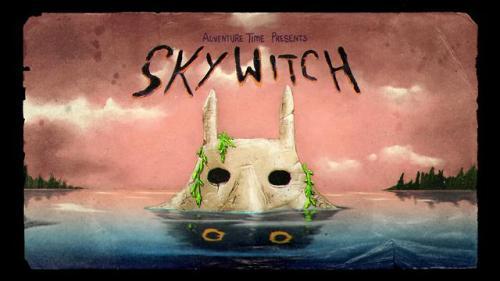
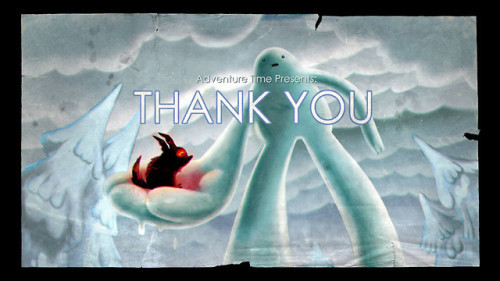
Sky Witch:
Marceline is on a top-secret mission tracking Maja the Sky Witch. But when she loses the witch’s trail, Marceline turns to Princess Bubblegum for help.
Thank You:
The Snow Golem visits the border between the Fire Kingdom and the Ice Kingdom and discovers a lost fire wolf that needed the golem’s help to get home.
propaganda under the cut
Sky Witch:
of all the bubbline classics (tm) of the show, this episode is one of the best in the series, in showcasing the bittersweet, tenuous relationship these two are starting to forge in the aftermath of what was missing. there is still so much to unpack, in regards of both how they view themselves and each other. however. marceline will still ask bonnie for help. and bonnie will still help marceline regardless, because how could she not? despite everything, they will come back for each other (as varmints will tell us), even if they both are not completely over the hurt they caused each other, hanging bitter throughout the episode, making them lash out. yet, bonnie will give away the shirt marceline literally threw at her at a random concert, before even knowing each other, that she kept for years and treasured so much to wear daily and nightly, just because of how much hambo meant to marceline, just to make her happy; because, how could she not? like.....c'mon. the fact that the shirt itself is hundreds of times more powerful than hambo, like c'mon. vote just for the sheer yuri insanity.
What Was Missing may have invented bubbline, but I wanted to make sure Sky Witch got nominated because this is the moment where it really clicked for me. It felt validating, like the subtext people got from WWM wasn’t just fans looking too hard into things. Something shifted in my brain after this that turned me from an Enjoyer of the show to a super-fan.
Thank You:
I didn’t get this one as a teen, but it’s grown on me a lot. The theme of “even forces that seem diametrically opposed don’t have to be at odds, everyone deserves a little kindness” plus the quiet mood of the episode make it feel very special to me now.
#adventure time#atimers#fionna and cake#princess bubblegum#marceline abadeer#tournament poll#round 2
38 notes
·
View notes
Text
see now I feel the need to say that I am not, nor have ever been, against jayvik domestic post-canon AUs, please, they absolutely deserve to be domestic and live quietly and peacefully and just enjoy each other's company in that streamside cottage. the number of cottage fics I've read could, in fact, fill a cottage. let them bake cupcakes together, per harry lloyd. that's why we want them to have survived post-canon in the first place, so they can just fuck off and be happy together. like i'm also not against feminizing him in the general conceptual sense, of course, explore, do what you want, i'm not the fandom police. all I was saying was that making the skinny white guy in the ship be feminine practically by default is a bit trite and tropey, as well as heteronormative to think one of them needs to be feminine at all. just an assumption to think about before automatically drawing him all waiflike when he doesn't actually act that way in canon. femininity isn't bad, geez louise, it's just about the extremes to which things are taken, not the concept itself. I get equally peeved when Jayce is made to be more masculine than he canonically is (like making him a stud jock in college AUs just because of his physique when it's completely ooc). exaggerating perceived differences in a pairing so they can be opposites, diametrically opposed for the sake of it, which to me is the reductive part. there, i'm done, goodbye finally, this has raised my blood pressure way too much this week and I think I need to start only checking twitter once or twice a day because the algorithm is starting to shove fandom vitriol at me from people waaay outside my follow circle. perils of large fandoms. go have fun. mage viktor would want them to enjoy their cottage life. he needs to go water husk jayce's flowers now.
#not tagging this one jfc#this is how i've lasted this long in fandom - by shutting up and not getting involved in drama ever#but it's been a while since i've been in a fandom quite this gigantic. since like. supernatural days holy shit#im just glad everyone was nice to harry lloyd at the convention bc i s2g. after ofmd and su stuff i was terrified#big ol difference between domestic and magic trophy wife viktor lmao. esp if you hc him as transmasc why turn around and#immediately feminize him and make him have babies? idk. i don't pretend to understand and so i'm just gonna. step away.#tbh this is like the least of the weird shit happening in the arcane fandom based on the snippets i see thanks to the algorithm#just. breathe. breathe and curate the dash. fandom can be fun#i chant slowly to myself#the longer since the show ends the more levels of fanon begin to stack atop each other#now i'm off to keep writing this fic of mine which may eventually see the light of day in like six fucking months at this point
5 notes
·
View notes
Text
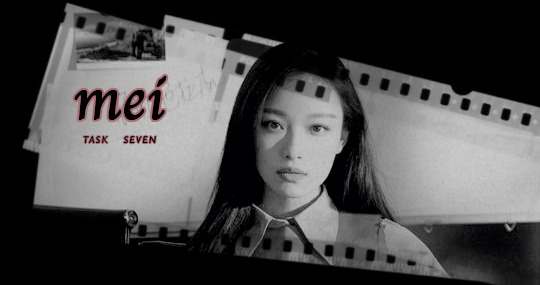
star sign: cancer mythological creature: phoenix folktale: lungmo fairytale character (classical or modern): thumbelina (hans christian andersen, 1835)
"Thumbelina escapes the toad and her son, and drifts on a lily pad until captured by a stag beetle who later discards her when his friends reject her company. [...] The mouse suggests Thumbelina marry her neighbor, a mole, but Thumbelina finds repulsive the prospect of being married to such a creature because he spent all his days underground and never saw the sun or sky. The field mouse keeps pushing Thumbelina into the marriage, saying the mole is a good match for her, and does not listen to her protests. At the last minute, Thumbelina escapes the situation by fleeing to a far land with a swallow she nursed back to health during the winter." (x)
3 fictional tropes: fate worse than death, bookworm, sensitive artist
Fate Worse than Death - "Think death is the cruelest fate? Think again. There are several things much worse. More often than not, some unfortunate soul will experience it." (x) Bookworm - "A character who just loves to read and collect books. They tend to be smarter, nerdier, and more into school than other characters, but some book enthusiasts are of average intelligence. [...] Expect for them to have few friends because they ignore or avoid others so they can sit down in a secluded area and indulge in reading." (x) Sensitive Artist - "'Sensitive' here typically refers to emotional sensitivity, being empathetic, introspective, or highly intuitive and perceptive to the feelings and thoughts of those around you. Portrayed positively, this lends itself to a kind, gentle, compassionate, and understanding disposition. When people say Artists Are Attractive because they're sensitive, this is usually what they're referring to." (x)
romantic or platonic trope: belligerent sexual tension, the playboy, odd friendship
Belligerent Sexual Tension - "There's a couple, usually a sometimes sweet, sometimes grouchy female paired with a secretly-kind jerk, who are not able to admit their feelings. At the top of their lungs." (x) The Playboy - "The lifelong playboy character finds themselves considering hanging up their player threads to be with someone who does not fall for their charms, or the protagonist sets upon a notorious playboy to improve them." (x) Odd Friendship - "A friendship which develops between two characters that would seem unlikely to be friends, whether it's because of them having diametrically opposed personalities, holding beliefs that would normally get one to try to demonize the other, or some other quirks of their beings that would lead to them clashing." (x)
creepypasta story: borrasca (x) greek god or goddess: pasiphae time of day where they draw the most energy: 9 am their achilles heel: her past coming back to further haunt her medieval weapon of choice: mancatcher survival, starvation, or death by the undead in the apocalypse: starvation which of the seven sins represent them? horseman of the apocalypse?: sloth, famine what their superpower would be: resurgence could they pull excalibur from the stone?: no one aesthetic for each of the five senses (taste, hearing, sight, smell, touch):
black coffee with just a half teaspoon of sugar added in, the scratch of a charcoal pencil against the thick pages of a sketchbook, the beauty of the sunrise when unable to sleep, the aroma of flipping through an old and used book, pulling an oversized sweater over your knuckles and pulling it tighter around yourself
a bad habit that won’t go away: unable to fall asleep and choosing to read late into the night instead a recurring nightmare: too graphic/violent to describe an object they consider their lucky charm: no longer in her possession but it was a necklace with a small 'm' charm that her mother bought her
#anchortask07#( ˗ˏˋ task. ´ˎ˗ )#borrasca is like...painfully accurate as far as creepypastas go ngl#the ship tropes needed both to be fully accurate ghfjdk
5 notes
·
View notes
Text
NaNoWriMo Day 5
It had been a long time since Shadriel had communed with the anima collective. He couldn’t do it directly – his demon essence kept the plane from him as surely as the anima collective’s combined energies kept their plane closed unto itself-- but through the spirits of intellect he’d managed to lure and collect to his cause, information could flow. And anima always followed thought wherever there was an opening, as surely as water flowed downhill through any cracks.
So Shadriel sat, tucked safely behind several circles of warding, a bevy of guards at the doors, and simply thought, letting the pieces of his conundrum flow out into the web of intellect spirits he’d cast into the wide world.
I have a seer, but no path to the Oracles. She has a guardian, strong and dedicated, but no real power to Defend her. I have a man who seeks Death, but leaves only dead bodies in his wake. He had a body that cannot die, at least not by any weakness he’s been able to discover.
Bit by bit, he began to feel eyes upon him. They weren’t proper eyes, of course; one would have to have to have a physical form to have eyes. But the anima collective was all made up of being who had once had eyes, and they remembered their former forms, though they disdained the limitations of flesh. As a being of pure flesh and physicality, Shadriel was surprised he’d been able to get their attention at all. Anima and Demons were diametrically opposed, just as Benevolents and Destinies were. It was only the planar paring of Oracles and Enforcers that worked in tandem rather than at odds. But the two sects of Destinies argued enough amongst themselves to make up for the harmony between the Oracles and Enforcers.
The eyes began to drift, annoyed that Shadriel’s thoughts were full of things well and commonly known. He shifted his focus back to the problem at hand.
The man who seeks Death but cannot die was made that way by the Shining ones. A shiver of outrage went through the collective at the thought of the kin that had cast them out, had bound them to a world of sticks and mud and so changed them. Or rather, inspired them to change themselves to escape it. There was a glimmer of possibility there, in the anima’s attempt to escape the binding curse by escaping physicality all together. It hadn’t worked, but the idea was worth turning over, even though it wasn’t quite fully formed.
Several anima scurried away with it, pleased with this offering and eager to ponder the burgeoning idea from every angle. Shad let it go, attaching an intellect spirit to each one, to be sure the information flowed back to him as they made their discoveries. He pressed on.
A body is an easy thing to change. Agreement, an echo of the opinion that bodies should be cast off all together, but consensus that their nature was highly malleable. Gods, it was dizzying thinking like this. Smugness that his singular mind could not keep up. Shad dismissed it. He liked being his own individual. He continued in his own singular train of thought.
Fate is not an easy thing to change. Annoyance at the interference of the other planars; Destinies and Oracles and Enforcers alike both worked to shape the world to suit their purposes, though with very different methods. Destinies read the threads of Fate woven by Ksm, a cosmic force personified as a weaving woman. One sect worked to support individuals with notable threads, the other worked to ensure the threads of the overall patterns stayed strong and true. They often butted heads with one another, as no one Destiny had all the pieces. Oracles had all the pieces, and set in stone certain immutable facts about the universe. Enforcers went out and made sure those facts remained so. Again, bored anima drifted away from the demon’s stating of the obvious.
But it can be shifted.
All in all, fate magic was a wretched stalemate. The best one could hope for was to hand a fate off to a different individual, dodging the worst for yourself by passing the buck. Such was the nature of luck magic. But if such workings were not done carefully, if balance was not maintained--
Threads snapped, balances shifted, accounts settled, Shining Ones come and must be answered to.
The collective was impatient enough with him to shout in a nearly unified voice. The last time the Shining Ones had had to intervene, the chimera and faeries had been born. Of those faeries, the Mente Court was starting to encroach on Anima territory. They could weave and bend the mind, manipulating thoughts and experiences like light through a prism, paint on a canvas, waves on the shore. The anima did not like these new faeries. They wished them gone.
What has been set by the Shining Ones must be, Shad thought carefully. But what they cannot see they cannot demand an accounting of. With an Oracle of our own, we could learn to work in the dark places of their sight.
A resounding cry of agreement and exultation went up, and several anima flooded along his intellect spirits to ride with them out into the world. He had found a seer with only those weak spirits. With anima bent to the cause, they would find an Oracle. One who wished to see what was not meant to be seen. One who could be tempted by their offer.
Shadriel opened his eyes and took a moment to ground himself in the physical world. He dropped his circles, opened the door to his chambers, and pulled one of the guards off the door and into his bed, where he put every inch of his wonderful body to use, and gloried in the pleasure of having it.
Day 1
4 notes
·
View notes
Text

If there are two things I love its monsters and nuclear radiation/fallout. Godzilla is and always has been a perfect marriage of these two hyperfixations of mine. I've seen this Godzilla a handful of times over the years and I love it every single time I watch it. (And, fun fact, strontium-90 was one of the isotopes released during Chernobyl though it's not the one that's mostly to blame for the tragedy that happened).
There are so many goofy things that happen in this movie that seem like plot holes but are actually what I feel like what people would really do in a situation like this. For example, they hypothesize that Godzilla was woken up because of the hydrogen bombs and their answer to fighting Godzilla off is... bombing them. You think a depth charge would do more damage than hydrogen bombs? Like, the whole thing is that Godzilla got stronger/empowered by the radiation. Goofy. Another small contradiction is at the beginning when the toothless elder explained that their oral history specified that Godzilla would come on land only if they ate all the available fish, but the villagers would offer a human sacrifice to get a better yield for fishing. It just shows the psyche of humans in an excellent but subtle way, I feel, that really makes the film not entirely fantastical. The humans act human and do dumb human things when faced with something so fantastical. (Also, I love the idea of these oral histories that are so common in human society [coming from a classics major] being used for a badass old mutated dinosaur. It's so close to magical realism I eat that shit up!!!)
Obviously this movie is a critique on what radiation does to society and the monsters the bombs were both specifically to Japanese society as well as civilization as a whole. It warps and mutates things that could, theoretically, be peaceful into abhorrent destructive monsters. Nuclear bombs, hydrogen bombs, etc. all of it are these massive giants that humans created in order to terrorize other humans, because there really is no other reason to create a bomb with these particular isotopes and elements, what have you, besides absolute destruction. You could argue that Godzilla themself is a physical manifestation of the United Status--a giant, irradiated monster that attacked Japanese society--and I think plenty of people have made that comparison. It's an easy one to make and its not something I disagree with necessarily.
Another way you could look at it along the similar vein of what I said above is that Godzilla represents the "what if" that Japanese society likely had during the war. What if the U.S targeted Tokyo instead of Nagasaki or Hiroshima? The other "what if" aspects that I think are very to-the-point in this is the conversations between the two diametrically opposed sides on how to deal with Godzilla.
You have the side that wants to just straight up kill them, which I think lends itself to the Japanese war-mindset that was victory above all else. It's not a strictly Japanese mindset either, because humans really do love killing each other just for funsies or for money. It's also a hypermasculine ideal (in my opinion) that the one with more weapons/is stronger will prevail. They show off their technology and firepower and it's all raaah I'm a tough guy. (This is further argued for when you think about how... someone, I forget who, said that Japan didn't win the war because they were technologically behind. You could argue that making this film is a way for them to get some of that face back like "look, see, we have technology and know how to use it too!" but this isn't something I fully argue for. I can just see how one could).
The other side is fighting for the scientific research aspect. It's specifically stated that it would be good to study Godzilla to see why they are so protected against radiation, which I imagine during the time of the war and afterwards is something the Japanese specifically would want to know the answers to considering they were BOMBED. Radiation was a fairly "recent" discovery too that was a whole ass wild card no one fully understood but played with anyway. Learning from Godzilla how they were able to be protected from radiation would do incredible from the humanist standpoint of protecting the population from greedy overpowered war machines as well as going the marvel route and making some badass superhumans. I could go on about how I feel about both of these view points and I think its a fascinating discussion that we're still having even though this movie is nearly what, 70 years old? Godzilla fucks so hard.
Technical Shit:
Obsessed with the first bit we see of "Godzilla" is the blinding white light of the people on the boat. Obviously, duh, that's the light from the bombs (I believe the term is Cherenkov radiation? The light that the bombs give off. But I'm not 100% sure). The sound design fucks SO hard. Even after multiple viewings of this movie and all the ones that have come after, the original screech of Godzilla is so chilling and powerful. There's a weird jumpcut around 52 min mark with Emiko that was jarring. I did not like that but also its an old movie so I have to give it grace. Similarly the audio throughout is often blown out which is another product of its time, but owie my ears. Again, I love practical effects SO much. They add so much more to a movie in my opinion and Godzilla as mildly silly as they look in this movie still cuts an imposing figure. The sheer destruction throughout. UGH! Chefs kiss. 15/10.
edit: didn't realize but realizing now the parallel between Oppenheimer and Serizawa. do with that what you will.
4 notes
·
View notes
Note
Do you have thoughts on G.O.D.S?
Not as many as I would like!
The series was visually gorgeous-- Schiti and Gracia are always a winning combo-- but while I thought the premise was really interesting, I had a hard time connecting with the story and characters. This is something that I experience with a lot of Hickman's work, especially when he's operating in this big-picture worldbuilding mode. He tends to take on a somewhat detached tone, and his characters often feel more like mythologized images than present humans with interior thoughts and feelings. It doesn't help that the story itself is more like a series of disparate vignettes than a coherent plotline. That's not always a bad way to write a comic, and from a technical perspective, G.O.D.S. is well-structured, but it did make it harder for me to get invested.
To be fair, G.O.D.S. does have some instances of solid emotional connection. The characters feel a little more raw and present than they do in, say, HoXPoX, but then G.O.D.S. lacks the context and history that made HoXPoX so resonant. It also doesn't really have the same kind of impact on the rest of the Marvel world, which is... strange, because that's how it was advertised. It clearly wants to make a bigger splash, as it does reshape some really major parts of the Marvel cosmology, but Hickman is not the only person to innovate on those subjects in recent years-- Ewing, for example, has also done a ton of rebuilding with the multiverse structure and abstract entities. G.O.D.S. is not in conversation with, or even acknowledgment of, that work, and most of the changes it makes haven't actually carried over into other comics. Even the redesigned characters have gone back to their classic looks, which is fine because.... honestly, I didn't love the new designs!
I'm probably being a little too harsh. G.O.D.S. is an ambitious book with a lot of really cool ideas, I just don't find it to be a particularly engaging read. Hickman's take on this cosmology is actually quite refreshing, and, in a lot of ways, it is more to my taste than past iterations. I appreciate that the abstract entities are treated more literally as personified concepts, and I like the idea of them working in balanced pairs-- even if some those pairs don't make total sense-- and acting through avatars or intermediaries. I also thought it was really cool how each entity was designed to have multiple forms and manifestations, even if I, again, don't love the designs themselves. All told, I guess it's a pretty mixed bag.
The thing I struggle with the most, unfortunately, is the central conceit of science vs. magic. I've never understood that dichotomy, and G.O.D.S. doesn't really do much to sell me on it. And yes, I do roll my eyes when it comes up as part of Wanda's backstory, too, although I think it works okay in service of her Nexus lore-- but the fact that characters like Wanda, Pietro, and Victor exist seems like proof that these concepts are not diametrically opposed. It's odd that none of them show up in this series, either, or even get a mention, but that's just one of several choices that feel transparently arbitrary. The Powers-That-Be do make sense as a character-- there is some precedence for beings like her, and it's not hard to imagine what kind of function she might serve. I have a harder time understanding the purpose of the Order-Of-Things, besides just being her opposite. I feel the same way about their servants-- Wyn, Mia, and the Centivar feel superfluous to characters like Doctor Strange and the Fantastic Four, or any number of other major magic and science players.
I probably wouldn't be complaining about that if these characters and concepts had actually carried over into other comics. Aside from the Powers making a brief appearance in V&SW, they've mostly been MIA-- pun intended. Maybe in a few years, when things have had more time to marinate I'll feel differently, but right now, my impression of G.O.D.S. is that it was cool, creative, and ambitious, but ultimately didn't justify itself or make much of a lasting impression. For something that should have been right up my alley, I didn't particularly enjoy reading it and I barely ever think about it.
0 notes
Text
WELCOME
THIS IS THE SECRET SLOW-SHOW... or at least, its teaser trailer. We stole our teasing game from the greats: Bungie Studios, disinterested women with wealthy dates, and the impending doom of WW3 itself. This is the homegrown Ground Floor of a Velvet and anti-Bolshevik Revolution: WELCOME. Having reassembled ourselves in Perfect and Pure Honesty to stand in diametrically opposed contrast to divisive action and antagonistic children, we now present our Selves to you...elsewhere. This is just the long, slow, tease and aim-to-please. (And, as you'll come to find out, without Doubt–beyond the hot Seas of C.S. Lewis, Lewis Carroll and C. Henry B., seizing violently as you try to cross over or the quick, crisp trip–below the Tower window as you tumble out and through, and Above-It-All in Love watching the whole thing unfold into "you" from within the Sky above You that we all Love and remember– oh, every single shade in love revealed and told, Beloved!– We LOVE YOU ALL, SO VERY MUCH)
We're not ready for Our Big Reveal. We're still building love-bombs in our Basement, three-walled birdhouses for each window in Middle-Management, and working towards developing a culty, little printing press and a hot-to-trot website to house our (Virtual) Museum. We plan to be Real, too. We've got all the Angels Here, with their Seven Seals broken open, and angles you've not seen in any of your Sutras. However...we've got a charity case on our hands downstairs, and we're trying to take care of Our Cradle, first. (The Cult was formed 15 years ago– you're now just living out our One-Man, Four Hand, Half-Bull but Infinite-Band slow-and-low LGBTBBQ Pink Floyd Planetarium Lightshow– having scattered like seeds in the wind just for all of us to come back Home... but we're always looking for Contributors and new Members in and Friends of THE HOUSE OF: BLACK PAGE WHITE INK NATIVE TONGUE) Just not "here." If you can meet us Here, however, then we can really talk, and not in poetry or prose. "Here" is for the long, soft whisper and the promotion of others. (At least, while we're in the trailer still yet)
#spilled ink#Love#Lust#etc#Love Lust etc.#indie publishing#guided meditation#guided mmmmm... something else that rhymes with “meditation”#the Serious Man from Downstairs#The Man with the Microphone
0 notes